Assessment Task 2: Written Report on an Interview About Healthy Ageing
VerifiedAdded on 2021/06/17
|10
|2263
|126
Report
AI Summary
This report presents a student's analysis of an interview with a 68-year-old man, referred to as Mr. Henry, to understand his perspective on healthy ageing. The report details the interview process, including the consideration of the patient's situation, collection and processing of cues based on the Levett-Jones clinical reasoning cycle, and the patient's expressed views on aging, health habits, and healthcare support. The assignment explores the facilitators and barriers to healthy ageing, such as communication skills, financial concerns, and unhealthy lifestyle choices. The student reflects on the interview process, highlighting the importance of communication skills and patient autonomy in healthcare, and concludes with recommendations for promoting healthy ageing. The report also includes references to relevant literature on gerontology and healthcare practices.
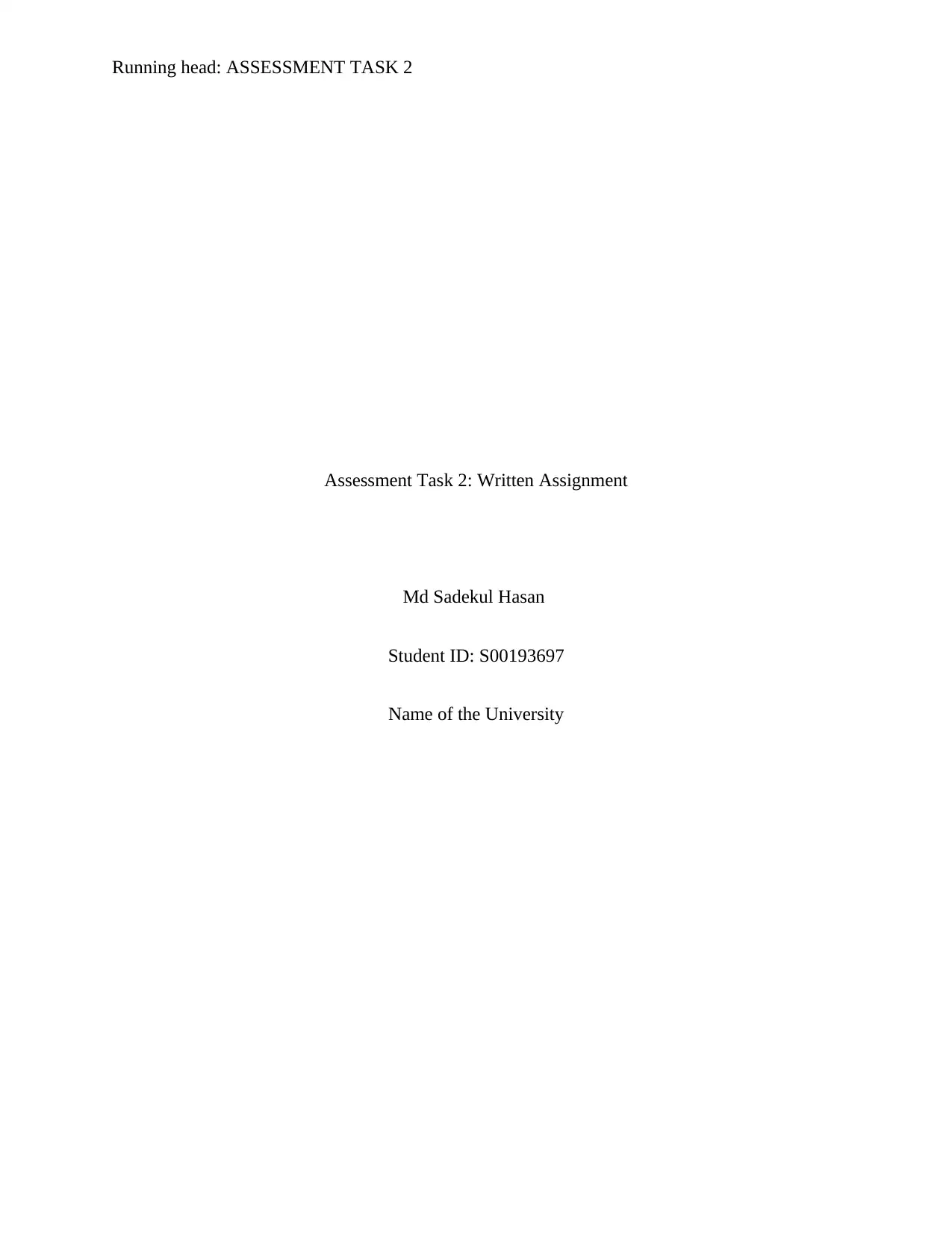
Running head: ASSESSMENT TASK 2
Assessment Task 2: Written Assignment
Md Sadekul Hasan
Student ID: S00193697
Name of the University
Assessment Task 2: Written Assignment
Md Sadekul Hasan
Student ID: S00193697
Name of the University
Paraphrase This Document
Need a fresh take? Get an instant paraphrase of this document with our AI Paraphraser
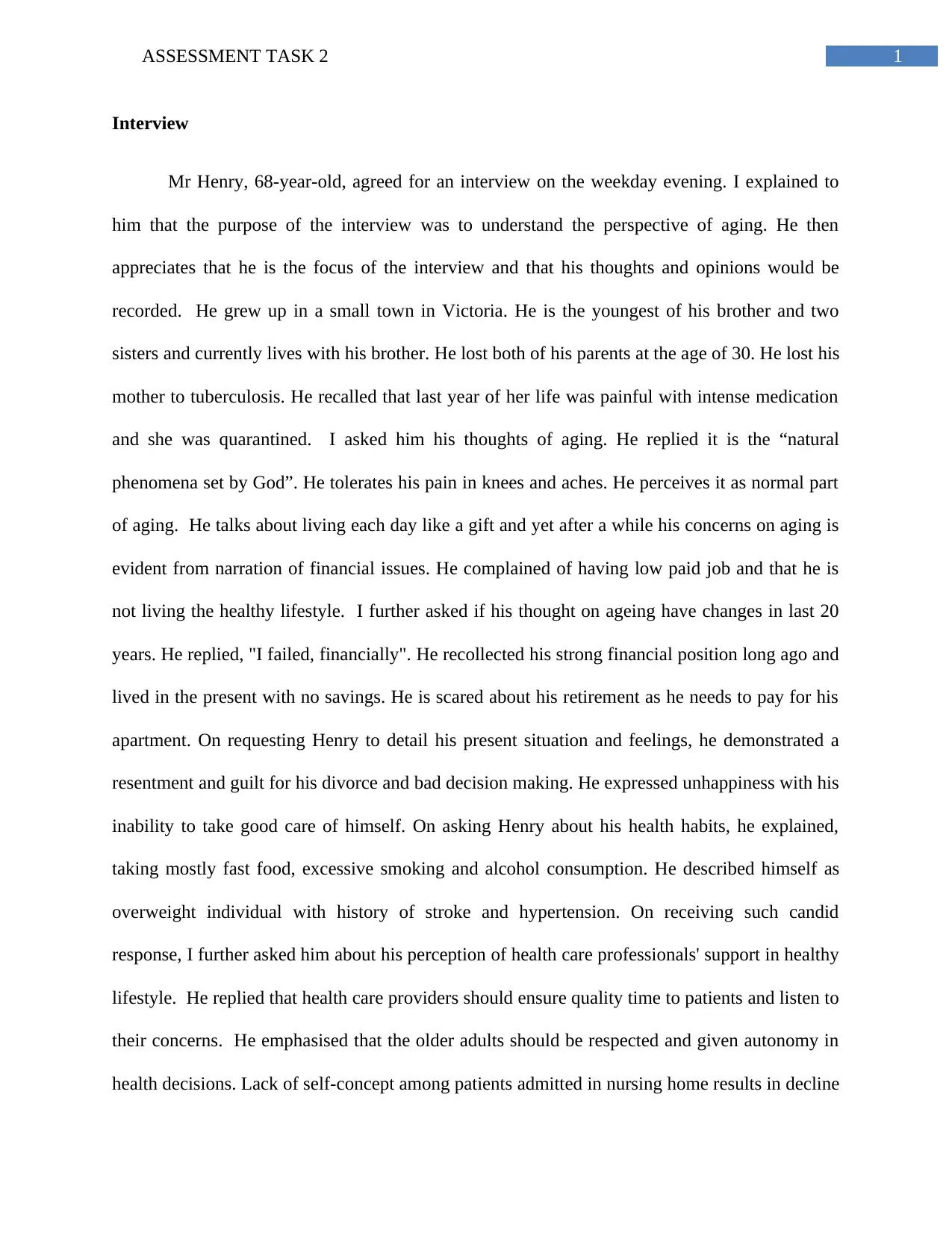
1ASSESSMENT TASK 2
Interview
Mr Henry, 68-year-old, agreed for an interview on the weekday evening. I explained to
him that the purpose of the interview was to understand the perspective of aging. He then
appreciates that he is the focus of the interview and that his thoughts and opinions would be
recorded. He grew up in a small town in Victoria. He is the youngest of his brother and two
sisters and currently lives with his brother. He lost both of his parents at the age of 30. He lost his
mother to tuberculosis. He recalled that last year of her life was painful with intense medication
and she was quarantined. I asked him his thoughts of aging. He replied it is the “natural
phenomena set by God”. He tolerates his pain in knees and aches. He perceives it as normal part
of aging. He talks about living each day like a gift and yet after a while his concerns on aging is
evident from narration of financial issues. He complained of having low paid job and that he is
not living the healthy lifestyle. I further asked if his thought on ageing have changes in last 20
years. He replied, "I failed, financially". He recollected his strong financial position long ago and
lived in the present with no savings. He is scared about his retirement as he needs to pay for his
apartment. On requesting Henry to detail his present situation and feelings, he demonstrated a
resentment and guilt for his divorce and bad decision making. He expressed unhappiness with his
inability to take good care of himself. On asking Henry about his health habits, he explained,
taking mostly fast food, excessive smoking and alcohol consumption. He described himself as
overweight individual with history of stroke and hypertension. On receiving such candid
response, I further asked him about his perception of health care professionals' support in healthy
lifestyle. He replied that health care providers should ensure quality time to patients and listen to
their concerns. He emphasised that the older adults should be respected and given autonomy in
health decisions. Lack of self-concept among patients admitted in nursing home results in decline
Interview
Mr Henry, 68-year-old, agreed for an interview on the weekday evening. I explained to
him that the purpose of the interview was to understand the perspective of aging. He then
appreciates that he is the focus of the interview and that his thoughts and opinions would be
recorded. He grew up in a small town in Victoria. He is the youngest of his brother and two
sisters and currently lives with his brother. He lost both of his parents at the age of 30. He lost his
mother to tuberculosis. He recalled that last year of her life was painful with intense medication
and she was quarantined. I asked him his thoughts of aging. He replied it is the “natural
phenomena set by God”. He tolerates his pain in knees and aches. He perceives it as normal part
of aging. He talks about living each day like a gift and yet after a while his concerns on aging is
evident from narration of financial issues. He complained of having low paid job and that he is
not living the healthy lifestyle. I further asked if his thought on ageing have changes in last 20
years. He replied, "I failed, financially". He recollected his strong financial position long ago and
lived in the present with no savings. He is scared about his retirement as he needs to pay for his
apartment. On requesting Henry to detail his present situation and feelings, he demonstrated a
resentment and guilt for his divorce and bad decision making. He expressed unhappiness with his
inability to take good care of himself. On asking Henry about his health habits, he explained,
taking mostly fast food, excessive smoking and alcohol consumption. He described himself as
overweight individual with history of stroke and hypertension. On receiving such candid
response, I further asked him about his perception of health care professionals' support in healthy
lifestyle. He replied that health care providers should ensure quality time to patients and listen to
their concerns. He emphasised that the older adults should be respected and given autonomy in
health decisions. Lack of self-concept among patients admitted in nursing home results in decline
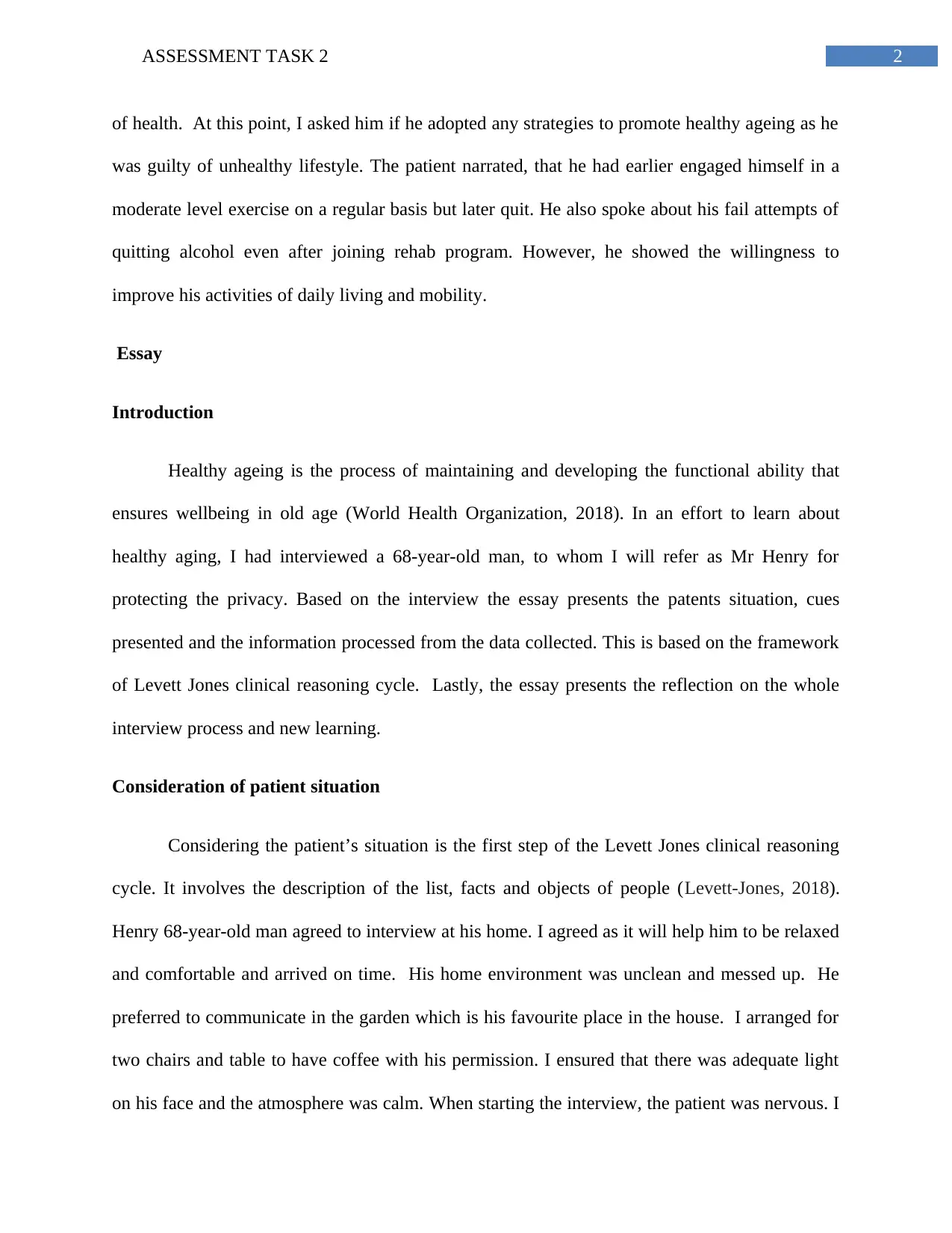
2ASSESSMENT TASK 2
of health. At this point, I asked him if he adopted any strategies to promote healthy ageing as he
was guilty of unhealthy lifestyle. The patient narrated, that he had earlier engaged himself in a
moderate level exercise on a regular basis but later quit. He also spoke about his fail attempts of
quitting alcohol even after joining rehab program. However, he showed the willingness to
improve his activities of daily living and mobility.
Essay
Introduction
Healthy ageing is the process of maintaining and developing the functional ability that
ensures wellbeing in old age (World Health Organization, 2018). In an effort to learn about
healthy aging, I had interviewed a 68-year-old man, to whom I will refer as Mr Henry for
protecting the privacy. Based on the interview the essay presents the patents situation, cues
presented and the information processed from the data collected. This is based on the framework
of Levett Jones clinical reasoning cycle. Lastly, the essay presents the reflection on the whole
interview process and new learning.
Consideration of patient situation
Considering the patient’s situation is the first step of the Levett Jones clinical reasoning
cycle. It involves the description of the list, facts and objects of people (Levett-Jones, 2018).
Henry 68-year-old man agreed to interview at his home. I agreed as it will help him to be relaxed
and comfortable and arrived on time. His home environment was unclean and messed up. He
preferred to communicate in the garden which is his favourite place in the house. I arranged for
two chairs and table to have coffee with his permission. I ensured that there was adequate light
on his face and the atmosphere was calm. When starting the interview, the patient was nervous. I
of health. At this point, I asked him if he adopted any strategies to promote healthy ageing as he
was guilty of unhealthy lifestyle. The patient narrated, that he had earlier engaged himself in a
moderate level exercise on a regular basis but later quit. He also spoke about his fail attempts of
quitting alcohol even after joining rehab program. However, he showed the willingness to
improve his activities of daily living and mobility.
Essay
Introduction
Healthy ageing is the process of maintaining and developing the functional ability that
ensures wellbeing in old age (World Health Organization, 2018). In an effort to learn about
healthy aging, I had interviewed a 68-year-old man, to whom I will refer as Mr Henry for
protecting the privacy. Based on the interview the essay presents the patents situation, cues
presented and the information processed from the data collected. This is based on the framework
of Levett Jones clinical reasoning cycle. Lastly, the essay presents the reflection on the whole
interview process and new learning.
Consideration of patient situation
Considering the patient’s situation is the first step of the Levett Jones clinical reasoning
cycle. It involves the description of the list, facts and objects of people (Levett-Jones, 2018).
Henry 68-year-old man agreed to interview at his home. I agreed as it will help him to be relaxed
and comfortable and arrived on time. His home environment was unclean and messed up. He
preferred to communicate in the garden which is his favourite place in the house. I arranged for
two chairs and table to have coffee with his permission. I ensured that there was adequate light
on his face and the atmosphere was calm. When starting the interview, the patient was nervous. I
⊘ This is a preview!⊘
Do you want full access?
Subscribe today to unlock all pages.

Trusted by 1+ million students worldwide
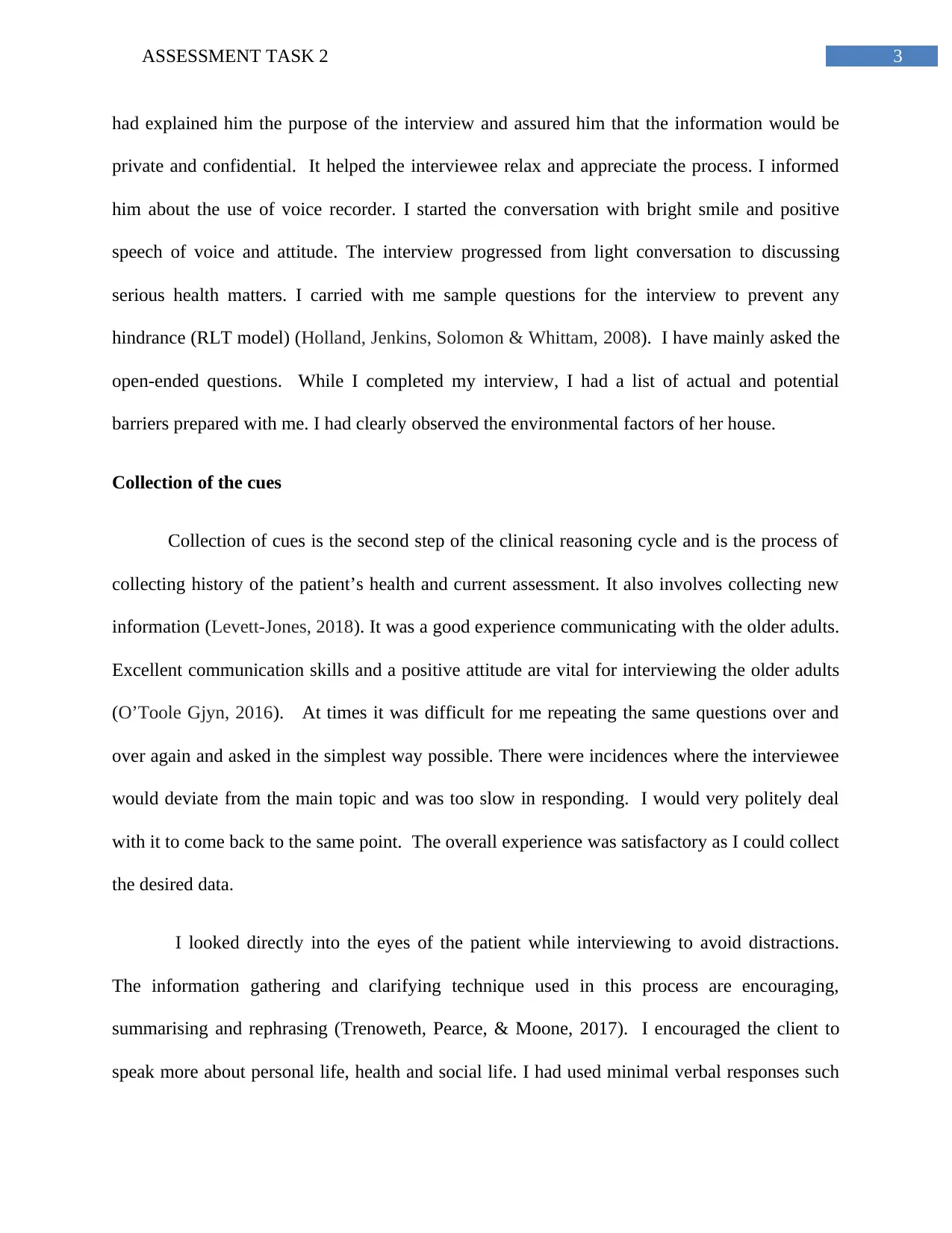
3ASSESSMENT TASK 2
had explained him the purpose of the interview and assured him that the information would be
private and confidential. It helped the interviewee relax and appreciate the process. I informed
him about the use of voice recorder. I started the conversation with bright smile and positive
speech of voice and attitude. The interview progressed from light conversation to discussing
serious health matters. I carried with me sample questions for the interview to prevent any
hindrance (RLT model) (Holland, Jenkins, Solomon & Whittam, 2008). I have mainly asked the
open-ended questions. While I completed my interview, I had a list of actual and potential
barriers prepared with me. I had clearly observed the environmental factors of her house.
Collection of the cues
Collection of cues is the second step of the clinical reasoning cycle and is the process of
collecting history of the patient’s health and current assessment. It also involves collecting new
information (Levett-Jones, 2018). It was a good experience communicating with the older adults.
Excellent communication skills and a positive attitude are vital for interviewing the older adults
(O’Toole Gjyn, 2016). At times it was difficult for me repeating the same questions over and
over again and asked in the simplest way possible. There were incidences where the interviewee
would deviate from the main topic and was too slow in responding. I would very politely deal
with it to come back to the same point. The overall experience was satisfactory as I could collect
the desired data.
I looked directly into the eyes of the patient while interviewing to avoid distractions.
The information gathering and clarifying technique used in this process are encouraging,
summarising and rephrasing (Trenoweth, Pearce, & Moone, 2017). I encouraged the client to
speak more about personal life, health and social life. I had used minimal verbal responses such
had explained him the purpose of the interview and assured him that the information would be
private and confidential. It helped the interviewee relax and appreciate the process. I informed
him about the use of voice recorder. I started the conversation with bright smile and positive
speech of voice and attitude. The interview progressed from light conversation to discussing
serious health matters. I carried with me sample questions for the interview to prevent any
hindrance (RLT model) (Holland, Jenkins, Solomon & Whittam, 2008). I have mainly asked the
open-ended questions. While I completed my interview, I had a list of actual and potential
barriers prepared with me. I had clearly observed the environmental factors of her house.
Collection of the cues
Collection of cues is the second step of the clinical reasoning cycle and is the process of
collecting history of the patient’s health and current assessment. It also involves collecting new
information (Levett-Jones, 2018). It was a good experience communicating with the older adults.
Excellent communication skills and a positive attitude are vital for interviewing the older adults
(O’Toole Gjyn, 2016). At times it was difficult for me repeating the same questions over and
over again and asked in the simplest way possible. There were incidences where the interviewee
would deviate from the main topic and was too slow in responding. I would very politely deal
with it to come back to the same point. The overall experience was satisfactory as I could collect
the desired data.
I looked directly into the eyes of the patient while interviewing to avoid distractions.
The information gathering and clarifying technique used in this process are encouraging,
summarising and rephrasing (Trenoweth, Pearce, & Moone, 2017). I encouraged the client to
speak more about personal life, health and social life. I had used minimal verbal responses such
Paraphrase This Document
Need a fresh take? Get an instant paraphrase of this document with our AI Paraphraser
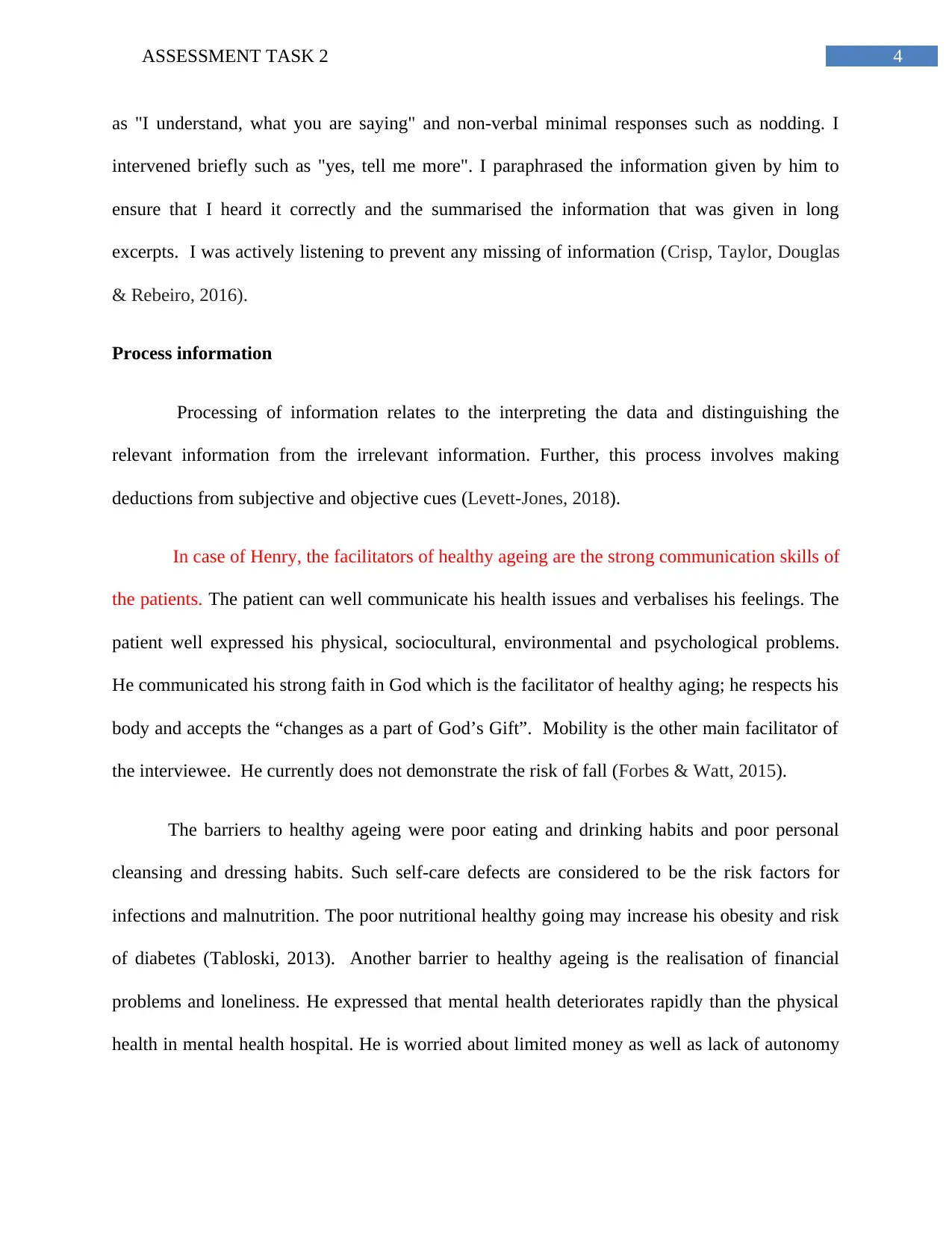
4ASSESSMENT TASK 2
as "I understand, what you are saying" and non-verbal minimal responses such as nodding. I
intervened briefly such as "yes, tell me more". I paraphrased the information given by him to
ensure that I heard it correctly and the summarised the information that was given in long
excerpts. I was actively listening to prevent any missing of information (Crisp, Taylor, Douglas
& Rebeiro, 2016).
Process information
Processing of information relates to the interpreting the data and distinguishing the
relevant information from the irrelevant information. Further, this process involves making
deductions from subjective and objective cues (Levett-Jones, 2018).
In case of Henry, the facilitators of healthy ageing are the strong communication skills of
the patients. The patient can well communicate his health issues and verbalises his feelings. The
patient well expressed his physical, sociocultural, environmental and psychological problems.
He communicated his strong faith in God which is the facilitator of healthy aging; he respects his
body and accepts the “changes as a part of God’s Gift”. Mobility is the other main facilitator of
the interviewee. He currently does not demonstrate the risk of fall (Forbes & Watt, 2015).
The barriers to healthy ageing were poor eating and drinking habits and poor personal
cleansing and dressing habits. Such self-care defects are considered to be the risk factors for
infections and malnutrition. The poor nutritional healthy going may increase his obesity and risk
of diabetes (Tabloski, 2013). Another barrier to healthy ageing is the realisation of financial
problems and loneliness. He expressed that mental health deteriorates rapidly than the physical
health in mental health hospital. He is worried about limited money as well as lack of autonomy
as "I understand, what you are saying" and non-verbal minimal responses such as nodding. I
intervened briefly such as "yes, tell me more". I paraphrased the information given by him to
ensure that I heard it correctly and the summarised the information that was given in long
excerpts. I was actively listening to prevent any missing of information (Crisp, Taylor, Douglas
& Rebeiro, 2016).
Process information
Processing of information relates to the interpreting the data and distinguishing the
relevant information from the irrelevant information. Further, this process involves making
deductions from subjective and objective cues (Levett-Jones, 2018).
In case of Henry, the facilitators of healthy ageing are the strong communication skills of
the patients. The patient can well communicate his health issues and verbalises his feelings. The
patient well expressed his physical, sociocultural, environmental and psychological problems.
He communicated his strong faith in God which is the facilitator of healthy aging; he respects his
body and accepts the “changes as a part of God’s Gift”. Mobility is the other main facilitator of
the interviewee. He currently does not demonstrate the risk of fall (Forbes & Watt, 2015).
The barriers to healthy ageing were poor eating and drinking habits and poor personal
cleansing and dressing habits. Such self-care defects are considered to be the risk factors for
infections and malnutrition. The poor nutritional healthy going may increase his obesity and risk
of diabetes (Tabloski, 2013). Another barrier to healthy ageing is the realisation of financial
problems and loneliness. He expressed that mental health deteriorates rapidly than the physical
health in mental health hospital. He is worried about limited money as well as lack of autonomy
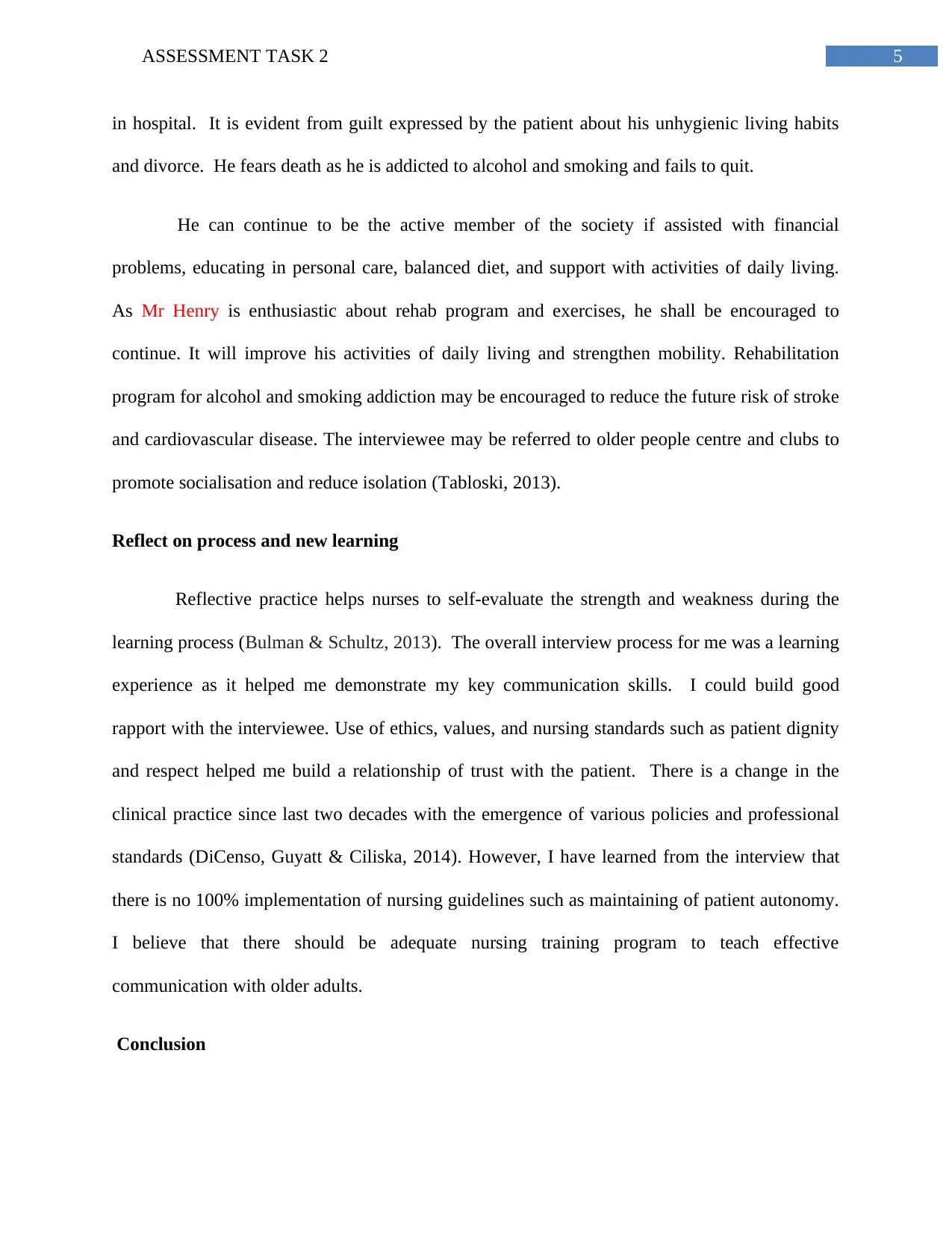
5ASSESSMENT TASK 2
in hospital. It is evident from guilt expressed by the patient about his unhygienic living habits
and divorce. He fears death as he is addicted to alcohol and smoking and fails to quit.
He can continue to be the active member of the society if assisted with financial
problems, educating in personal care, balanced diet, and support with activities of daily living.
As Mr Henry is enthusiastic about rehab program and exercises, he shall be encouraged to
continue. It will improve his activities of daily living and strengthen mobility. Rehabilitation
program for alcohol and smoking addiction may be encouraged to reduce the future risk of stroke
and cardiovascular disease. The interviewee may be referred to older people centre and clubs to
promote socialisation and reduce isolation (Tabloski, 2013).
Reflect on process and new learning
Reflective practice helps nurses to self-evaluate the strength and weakness during the
learning process (Bulman & Schultz, 2013). The overall interview process for me was a learning
experience as it helped me demonstrate my key communication skills. I could build good
rapport with the interviewee. Use of ethics, values, and nursing standards such as patient dignity
and respect helped me build a relationship of trust with the patient. There is a change in the
clinical practice since last two decades with the emergence of various policies and professional
standards (DiCenso, Guyatt & Ciliska, 2014). However, I have learned from the interview that
there is no 100% implementation of nursing guidelines such as maintaining of patient autonomy.
I believe that there should be adequate nursing training program to teach effective
communication with older adults.
Conclusion
in hospital. It is evident from guilt expressed by the patient about his unhygienic living habits
and divorce. He fears death as he is addicted to alcohol and smoking and fails to quit.
He can continue to be the active member of the society if assisted with financial
problems, educating in personal care, balanced diet, and support with activities of daily living.
As Mr Henry is enthusiastic about rehab program and exercises, he shall be encouraged to
continue. It will improve his activities of daily living and strengthen mobility. Rehabilitation
program for alcohol and smoking addiction may be encouraged to reduce the future risk of stroke
and cardiovascular disease. The interviewee may be referred to older people centre and clubs to
promote socialisation and reduce isolation (Tabloski, 2013).
Reflect on process and new learning
Reflective practice helps nurses to self-evaluate the strength and weakness during the
learning process (Bulman & Schultz, 2013). The overall interview process for me was a learning
experience as it helped me demonstrate my key communication skills. I could build good
rapport with the interviewee. Use of ethics, values, and nursing standards such as patient dignity
and respect helped me build a relationship of trust with the patient. There is a change in the
clinical practice since last two decades with the emergence of various policies and professional
standards (DiCenso, Guyatt & Ciliska, 2014). However, I have learned from the interview that
there is no 100% implementation of nursing guidelines such as maintaining of patient autonomy.
I believe that there should be adequate nursing training program to teach effective
communication with older adults.
Conclusion
⊘ This is a preview!⊘
Do you want full access?
Subscribe today to unlock all pages.

Trusted by 1+ million students worldwide
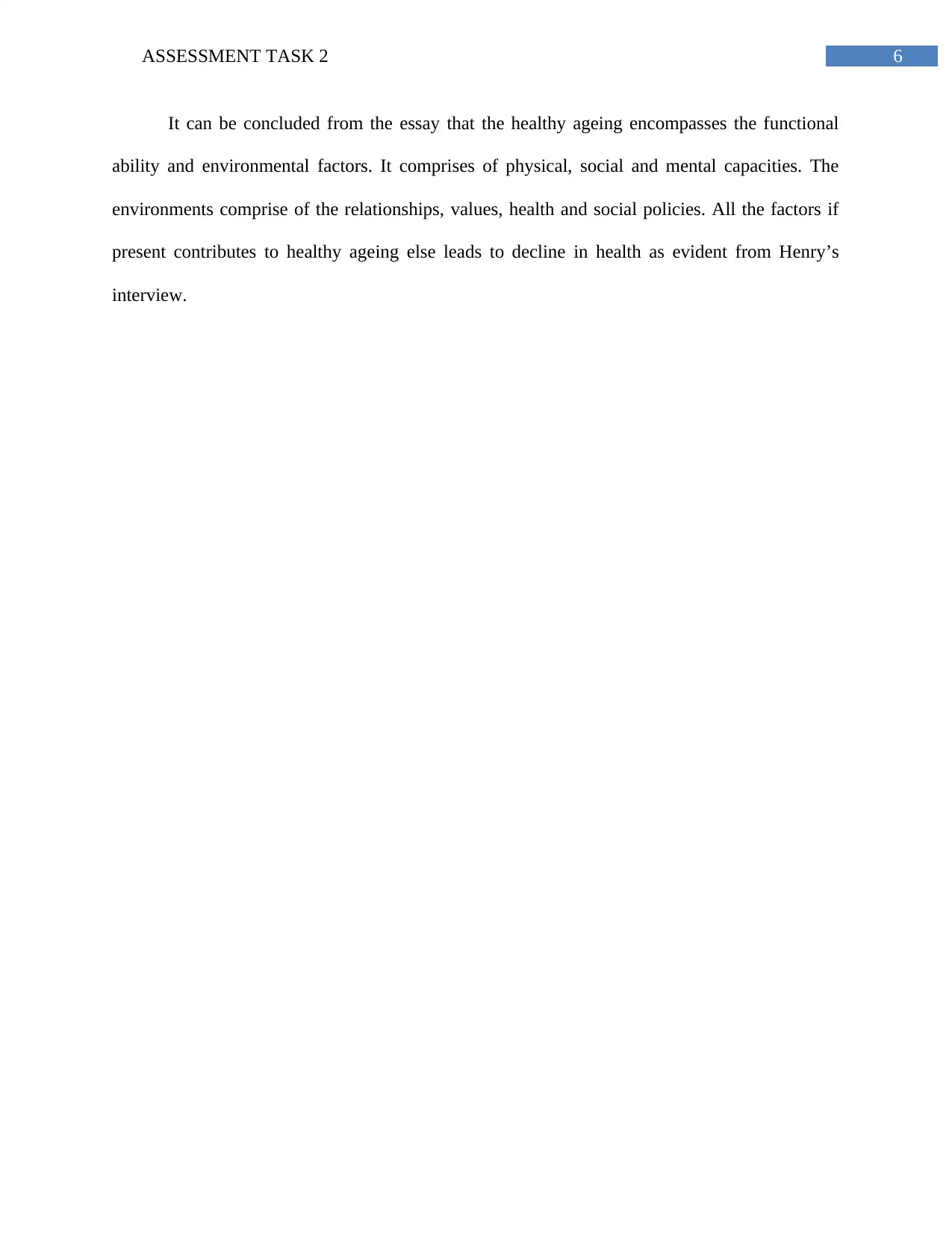
6ASSESSMENT TASK 2
It can be concluded from the essay that the healthy ageing encompasses the functional
ability and environmental factors. It comprises of physical, social and mental capacities. The
environments comprise of the relationships, values, health and social policies. All the factors if
present contributes to healthy ageing else leads to decline in health as evident from Henry’s
interview.
It can be concluded from the essay that the healthy ageing encompasses the functional
ability and environmental factors. It comprises of physical, social and mental capacities. The
environments comprise of the relationships, values, health and social policies. All the factors if
present contributes to healthy ageing else leads to decline in health as evident from Henry’s
interview.
Paraphrase This Document
Need a fresh take? Get an instant paraphrase of this document with our AI Paraphraser
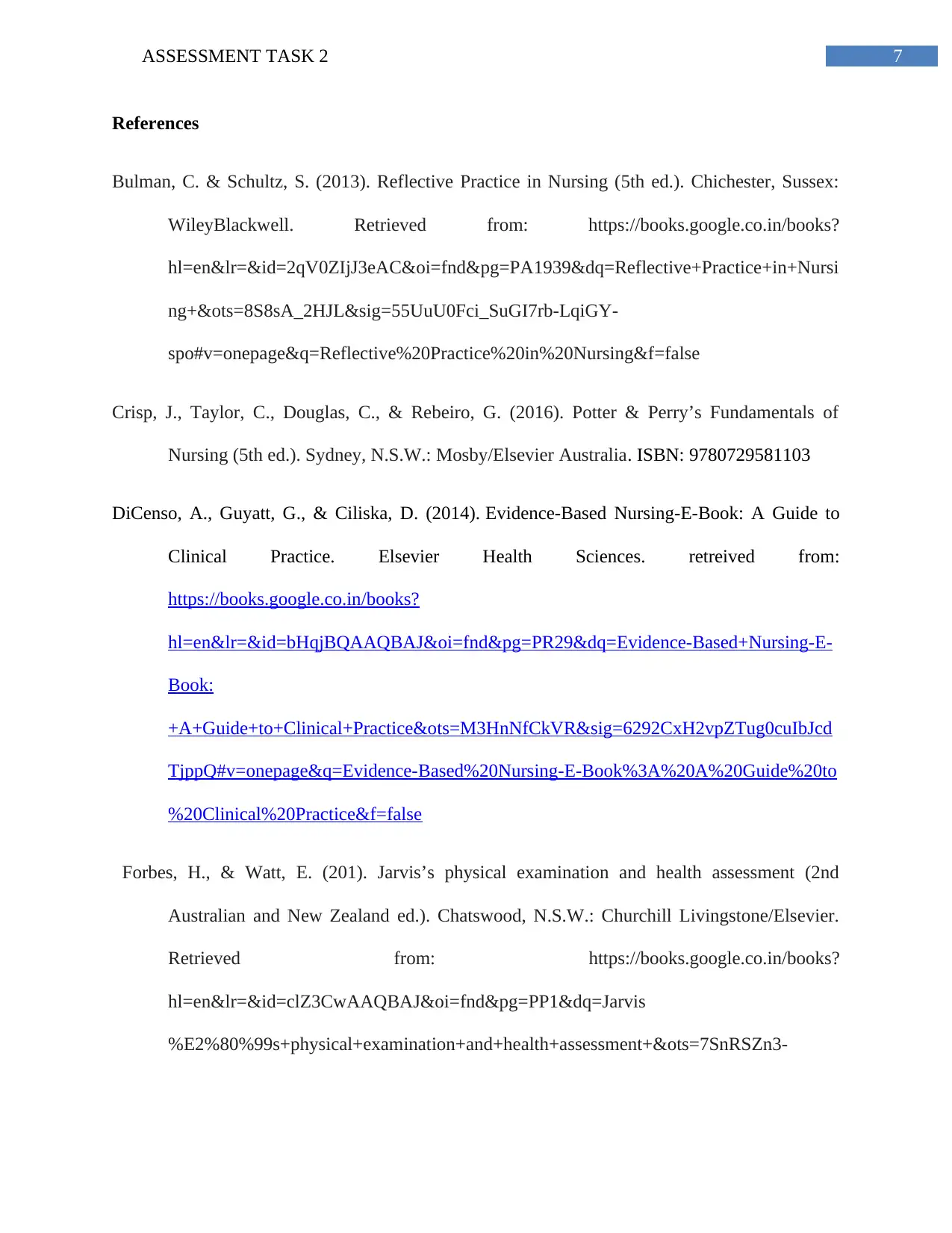
7ASSESSMENT TASK 2
References
Bulman, C. & Schultz, S. (2013). Reflective Practice in Nursing (5th ed.). Chichester, Sussex:
WileyBlackwell. Retrieved from: https://books.google.co.in/books?
hl=en&lr=&id=2qV0ZIjJ3eAC&oi=fnd&pg=PA1939&dq=Reflective+Practice+in+Nursi
ng+&ots=8S8sA_2HJL&sig=55UuU0Fci_SuGI7rb-LqiGY-
spo#v=onepage&q=Reflective%20Practice%20in%20Nursing&f=false
Crisp, J., Taylor, C., Douglas, C., & Rebeiro, G. (2016). Potter & Perry’s Fundamentals of
Nursing (5th ed.). Sydney, N.S.W.: Mosby/Elsevier Australia. ISBN: 9780729581103
DiCenso, A., Guyatt, G., & Ciliska, D. (2014). Evidence-Based Nursing-E-Book: A Guide to
Clinical Practice. Elsevier Health Sciences. retreived from:
https://books.google.co.in/books?
hl=en&lr=&id=bHqjBQAAQBAJ&oi=fnd&pg=PR29&dq=Evidence-Based+Nursing-E-
Book:
+A+Guide+to+Clinical+Practice&ots=M3HnNfCkVR&sig=6292CxH2vpZTug0cuIbJcd
TjppQ#v=onepage&q=Evidence-Based%20Nursing-E-Book%3A%20A%20Guide%20to
%20Clinical%20Practice&f=false
Forbes, H., & Watt, E. (201). Jarvis’s physical examination and health assessment (2nd
Australian and New Zealand ed.). Chatswood, N.S.W.: Churchill Livingstone/Elsevier.
Retrieved from: https://books.google.co.in/books?
hl=en&lr=&id=clZ3CwAAQBAJ&oi=fnd&pg=PP1&dq=Jarvis
%E2%80%99s+physical+examination+and+health+assessment+&ots=7SnRSZn3-
References
Bulman, C. & Schultz, S. (2013). Reflective Practice in Nursing (5th ed.). Chichester, Sussex:
WileyBlackwell. Retrieved from: https://books.google.co.in/books?
hl=en&lr=&id=2qV0ZIjJ3eAC&oi=fnd&pg=PA1939&dq=Reflective+Practice+in+Nursi
ng+&ots=8S8sA_2HJL&sig=55UuU0Fci_SuGI7rb-LqiGY-
spo#v=onepage&q=Reflective%20Practice%20in%20Nursing&f=false
Crisp, J., Taylor, C., Douglas, C., & Rebeiro, G. (2016). Potter & Perry’s Fundamentals of
Nursing (5th ed.). Sydney, N.S.W.: Mosby/Elsevier Australia. ISBN: 9780729581103
DiCenso, A., Guyatt, G., & Ciliska, D. (2014). Evidence-Based Nursing-E-Book: A Guide to
Clinical Practice. Elsevier Health Sciences. retreived from:
https://books.google.co.in/books?
hl=en&lr=&id=bHqjBQAAQBAJ&oi=fnd&pg=PR29&dq=Evidence-Based+Nursing-E-
Book:
+A+Guide+to+Clinical+Practice&ots=M3HnNfCkVR&sig=6292CxH2vpZTug0cuIbJcd
TjppQ#v=onepage&q=Evidence-Based%20Nursing-E-Book%3A%20A%20Guide%20to
%20Clinical%20Practice&f=false
Forbes, H., & Watt, E. (201). Jarvis’s physical examination and health assessment (2nd
Australian and New Zealand ed.). Chatswood, N.S.W.: Churchill Livingstone/Elsevier.
Retrieved from: https://books.google.co.in/books?
hl=en&lr=&id=clZ3CwAAQBAJ&oi=fnd&pg=PP1&dq=Jarvis
%E2%80%99s+physical+examination+and+health+assessment+&ots=7SnRSZn3-
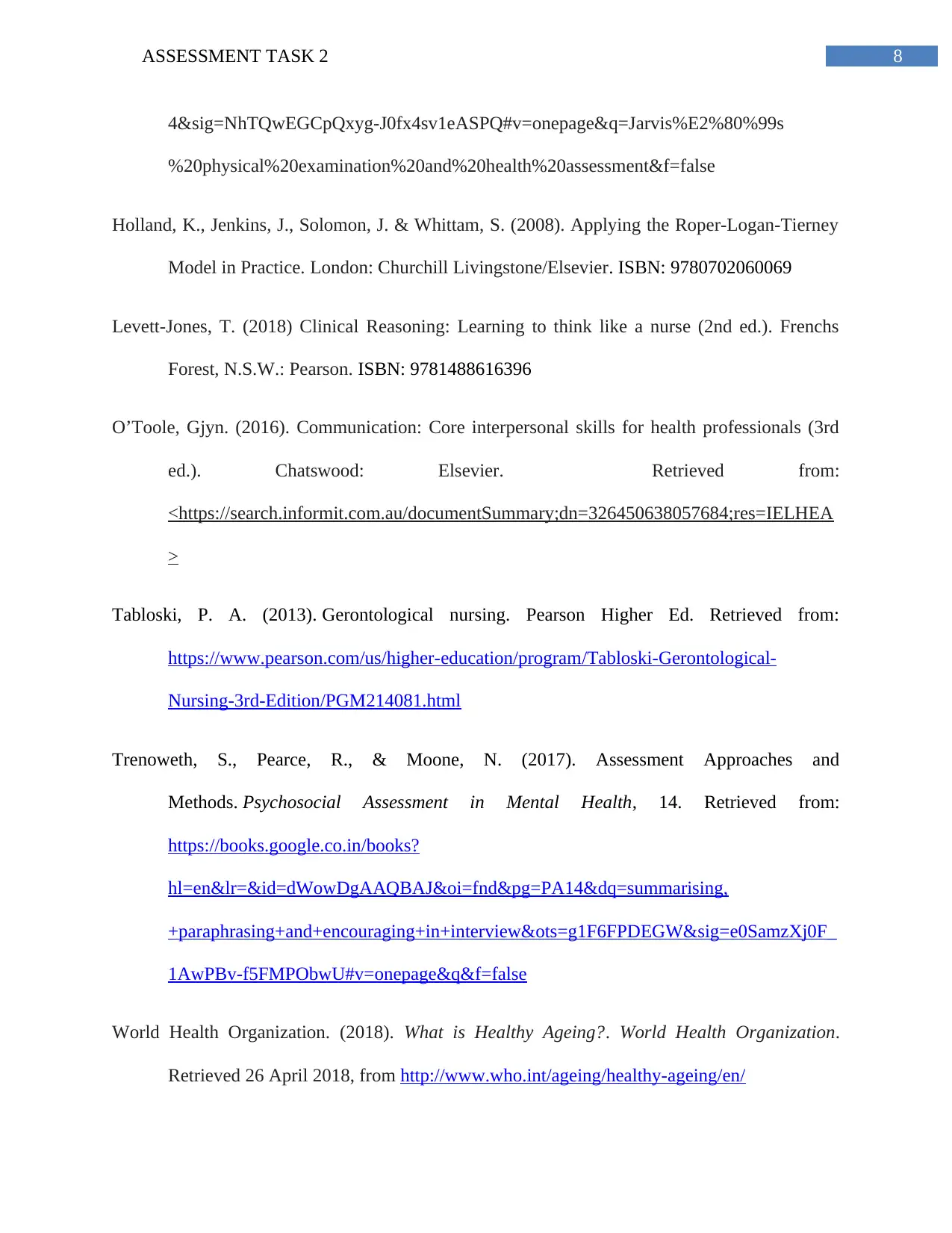
8ASSESSMENT TASK 2
4&sig=NhTQwEGCpQxyg-J0fx4sv1eASPQ#v=onepage&q=Jarvis%E2%80%99s
%20physical%20examination%20and%20health%20assessment&f=false
Holland, K., Jenkins, J., Solomon, J. & Whittam, S. (2008). Applying the Roper-Logan-Tierney
Model in Practice. London: Churchill Livingstone/Elsevier. ISBN: 9780702060069
Levett-Jones, T. (2018) Clinical Reasoning: Learning to think like a nurse (2nd ed.). Frenchs
Forest, N.S.W.: Pearson. ISBN: 9781488616396
O’Toole, Gjyn. (2016). Communication: Core interpersonal skills for health professionals (3rd
ed.). Chatswood: Elsevier. Retrieved from:
<https://search.informit.com.au/documentSummary;dn=326450638057684;res=IELHEA
>
Tabloski, P. A. (2013). Gerontological nursing. Pearson Higher Ed. Retrieved from:
https://www.pearson.com/us/higher-education/program/Tabloski-Gerontological-
Nursing-3rd-Edition/PGM214081.html
Trenoweth, S., Pearce, R., & Moone, N. (2017). Assessment Approaches and
Methods. Psychosocial Assessment in Mental Health, 14. Retrieved from:
https://books.google.co.in/books?
hl=en&lr=&id=dWowDgAAQBAJ&oi=fnd&pg=PA14&dq=summarising,
+paraphrasing+and+encouraging+in+interview&ots=g1F6FPDEGW&sig=e0SamzXj0F_
1AwPBv-f5FMPObwU#v=onepage&q&f=false
World Health Organization. (2018). What is Healthy Ageing?. World Health Organization.
Retrieved 26 April 2018, from http://www.who.int/ageing/healthy-ageing/en/
4&sig=NhTQwEGCpQxyg-J0fx4sv1eASPQ#v=onepage&q=Jarvis%E2%80%99s
%20physical%20examination%20and%20health%20assessment&f=false
Holland, K., Jenkins, J., Solomon, J. & Whittam, S. (2008). Applying the Roper-Logan-Tierney
Model in Practice. London: Churchill Livingstone/Elsevier. ISBN: 9780702060069
Levett-Jones, T. (2018) Clinical Reasoning: Learning to think like a nurse (2nd ed.). Frenchs
Forest, N.S.W.: Pearson. ISBN: 9781488616396
O’Toole, Gjyn. (2016). Communication: Core interpersonal skills for health professionals (3rd
ed.). Chatswood: Elsevier. Retrieved from:
<https://search.informit.com.au/documentSummary;dn=326450638057684;res=IELHEA
>
Tabloski, P. A. (2013). Gerontological nursing. Pearson Higher Ed. Retrieved from:
https://www.pearson.com/us/higher-education/program/Tabloski-Gerontological-
Nursing-3rd-Edition/PGM214081.html
Trenoweth, S., Pearce, R., & Moone, N. (2017). Assessment Approaches and
Methods. Psychosocial Assessment in Mental Health, 14. Retrieved from:
https://books.google.co.in/books?
hl=en&lr=&id=dWowDgAAQBAJ&oi=fnd&pg=PA14&dq=summarising,
+paraphrasing+and+encouraging+in+interview&ots=g1F6FPDEGW&sig=e0SamzXj0F_
1AwPBv-f5FMPObwU#v=onepage&q&f=false
World Health Organization. (2018). What is Healthy Ageing?. World Health Organization.
Retrieved 26 April 2018, from http://www.who.int/ageing/healthy-ageing/en/
⊘ This is a preview!⊘
Do you want full access?
Subscribe today to unlock all pages.

Trusted by 1+ million students worldwide
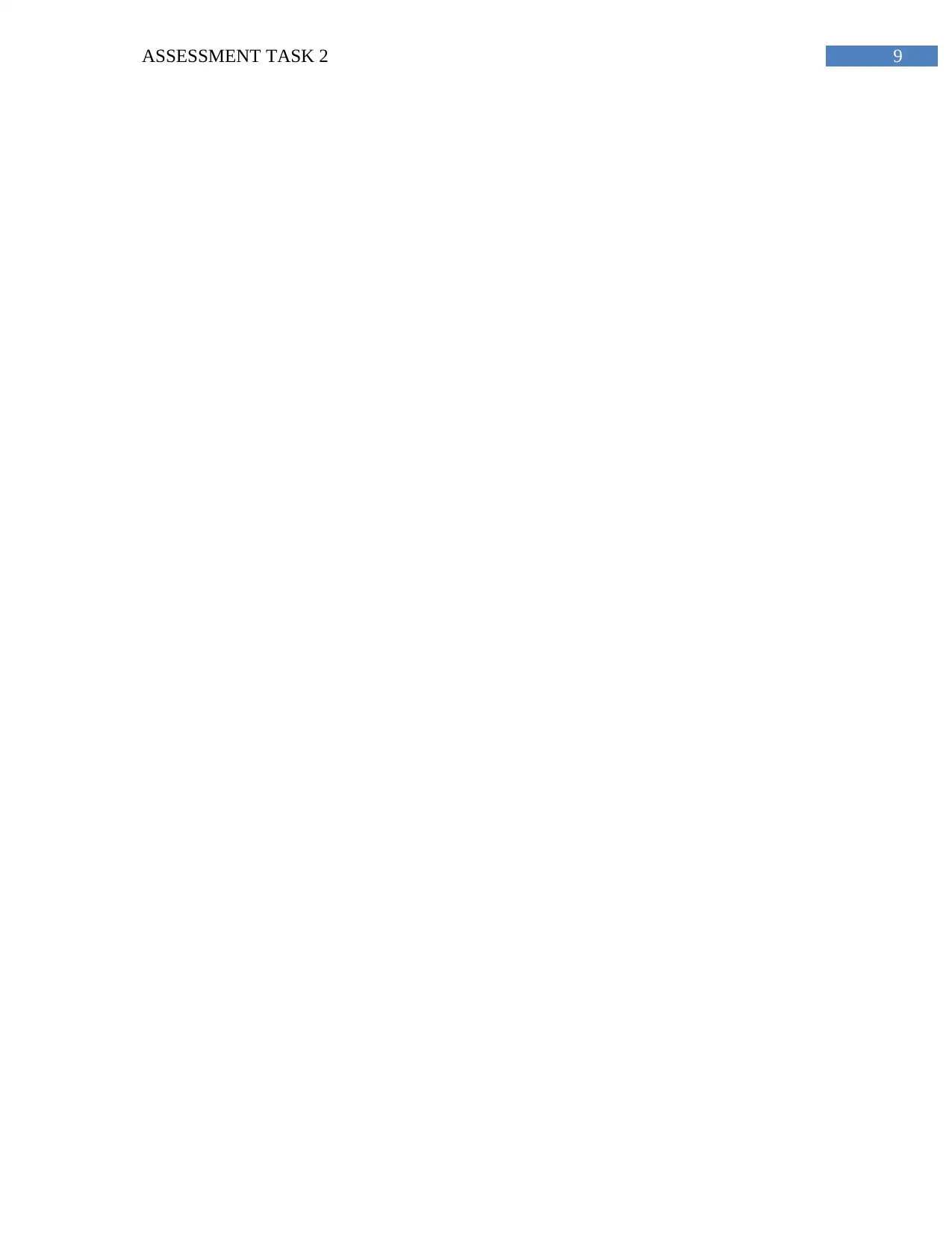
9ASSESSMENT TASK 2
1 out of 10
Related Documents
Your All-in-One AI-Powered Toolkit for Academic Success.
+13062052269
info@desklib.com
Available 24*7 on WhatsApp / Email
![[object Object]](/_next/static/media/star-bottom.7253800d.svg)
Unlock your academic potential
Copyright © 2020–2026 A2Z Services. All Rights Reserved. Developed and managed by ZUCOL.





